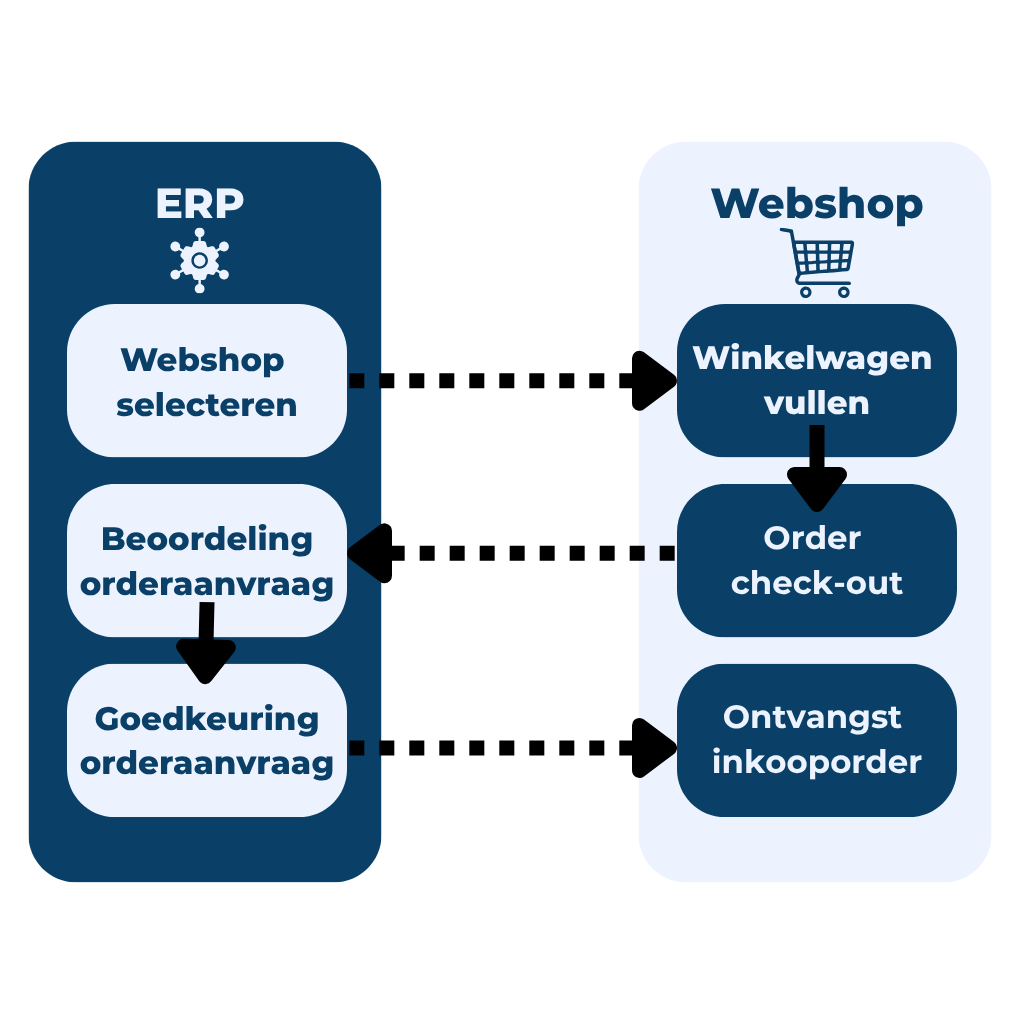PunchOut is a common term in B2B e-commerce. The technology may sound complex, but it is increasingly a requirement of corporate customers. PunchOut is used to link purchasing systems (procurement software) to web shops, making it easier for buyers to order within their own systems. In this blog, we explain what it is, what variants there are (OCI and cXML), why it is valuable for your B2B webstore, and how to implement it.
What is PunchOut?
The term PunchOut refers to the process by which a buyer navigates directly through his or her own procurement system to a supplier's webshop, selects products there, and sends them back to the procurement system for approval and further processing.
There are two main PunchOut variants:
- OCI PunchOut - the SAP variant, widely used in Europe.
- cXML PunchOut - based on XML and widely used in the US. This is the standard in systems such as Coupa, Oracle and SAP Ariba.
Although the user experience is almost identical, these standards differ technically significant. Therefore, it is important that your webshop can handle both.

Information flows between the ERP and the web shop.
OCI Open Catalog Interface (SAP standard)
OCI stands for Open Catalog Interface and is a protocol originally developed by SAP. In the Netherlands, it is often referred to as an "OCI link". The protocol defines how data on products and shopping baskets are exchanged between the webshop and the purchasing system.
cXML Commerce XML (Ariba standard)
cXML is the XML-based counterpart of OCI. It is used by Ariba (now also owned by SAP), Coupa, Oracle and other US enterprise procurement systems, among others. Whereas OCI works with HTTP parameters, cXML uses structured XML messages for communication.
How does the PunchOut process work?
For the buyer, the PunchOut process works as follows:
- Start from the procurement system → click on the supplier.
- Automatically logged into the webshop → no passwords required.
- Put together a shopping basket → select products.
- Shopping basket is returned to the purchasing system → Further approval takes place here.
- After approval, the order is finalised, often via EDI or e-mail.
Important customer benefit: because each order has a reference or order number on it, an invoice with that same reference can often be are automatically approved. This significantly speeds up invoice processing, as the purchase has already been approved within the system.
Why support PunchOut in your webshop?
For many B2B customers, PunchOut is the preferred method of placing orders. Especially for larger companies, this is a standard part of their procurement process.
Well-known procurement systems include:
- Afas
- Exact (Proquro)
- Visma (Spend Cloud)
- Sage
- Onventis
For enterprise organisations, you more often see packages such as Coupa, Oracle and SAP Ariba.
The benefits for your customer
- One central environment: buyers don't need to open or log in to your webshop separately.
- Quick order: find and add products without additional operations.
- Built-in authorisation: orders automatically follow internal approval flows.
- Efficient invoice processing: thanks to order references, fewer manual checks are needed.
When is PunchOut interesting?
PunchOut is particularly relevant for regular customers who regularly order through your B2B webshop, such as installers, wholesale customers or manufacturing companies. In addition, we see that PunchOut is increasingly a hard requirement is in tenders and supplier selections.
How do you technically arrange this?
PunchOut rarely comes standard in your e-commerce software. For Magento and Shopware it is a customised extension that includes these components, among others:
Technical requirements:
- Unique PunchOut URL: this URL is placed in the procurement system. It provides automatic login and contains a so-called callback URL.
- Shopping basket feedback: via a POST-request to the callback URL, according to SAP specifications (for OCI) or XML schemas (for cXML).
- Order processing (optional): you can extend the process with automatic order processing via EDI or e-mail, including order confirmations.
Practical implementation: Abeta Plugin for Magento and Shopware
We cooperate for this technique with Abeta. They have a specialised plugin that both OCI as cXML PunchOut supports, from a single solution. That means:
- One plugin for both standards (OCI + cXML).
- Communication with both the customer and the technical managers of the procurement system is provided.
- Flexible support for anomalous data mapping or specific system requirements.
Abeta also supervises the customer contact, if required, so that you, the webshop administrator, are relieved when setting up the link.
Want to know more about PunchOut for your B2B webshop?
PunchOut makes the difference in B2B e-commerce. Especially if you work with larger customers or want to future-proof your webshop. Contact us for a no-obligation consultation.






